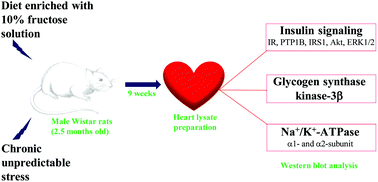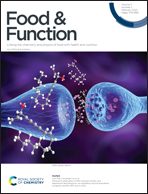Effects of a fructose-rich diet and chronic stress on insulin signaling and regulation of glycogen synthase kinase-3 beta and the sodium–potassium pump in the hearts of male rats
Abstract
Both a diet rich in fructose and chronic stress exposure induce metabolic and cardiovascular disturbances. The aim of this study was to examine the effects of the fructose-rich diet and chronic stress, separately and in combination, on insulin signaling and molecules regulating glycogen synthesis and ion transport in the heart, and to reveal whether these effects coincide with changes in glucocorticoid receptor (GR) activation. Male Wistar rats were subjected to 10% fructose in drinking water and/or to chronic unpredictable stress for 9 weeks. Protein expression and/or phosphorylation of the insulin receptor (IR), protein tyrosine phosphatase 1B, insulin receptor substrate 1 (IRS1), protein kinase B (Akt), extracellular signal-regulated kinase 1/2 (ERK1/2), glycogen synthase kinase-3β (GSK-3β) and Na+/K+-ATPase α-subunits in cardiac tissue were analyzed by western blot. GR distribution between cytosolic and nuclear fractions was also analyzed. The fructose-rich diet decreased the level of pERK1/2 (Thr202/Tyr204) and pGSK-3β (Ser9) independently of stress, while chronic stress increased the IRS1 content and prevented the fructose diet-induced decrease of the pAkt (Ser473) level. The fructose-rich diet in combination with chronic stress reduced the protein content of cardiac IR and attenuated IRS1 upregulation. Separate treatments increased the protein content of Na+/K+-ATPase α1- and α2-subunits, while after combined treatment the α2 content was at the control level and the α1 content was lower than the control level. The effect of combined treatment on cardiac IR and α2-subunit expression could be mediated by increased GR nuclear accumulation. Our study provides new insights into the effects of chronic stress and a combination of the fructose diet and chronic stress on the studied molecules in the heart.



 Please wait while we load your content...
Please wait while we load your content...